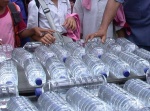As recent events continue to show us, one never knows when either a man-made or natural disaster can strike. Normal, routine, everyday life can change in the twinkling of an eye. Part of being a responsible adult (especially if one has a family to protect and care for) is to be mentally and physically prepared to face a wide variety of crisis and scenarios. SHTF scenarios unfold everyday across the world and have claimed the lives of countless millions. It doesn't take a genius to realize that the increasing complexity and fragility of our modern technological society and financial systems, increased concentration of governmental power, and deepening ideological divides are a cause for concern. While we are blessed to live the relatively comfortable and secure lives that we do, there is no guarantee that cannot change overnight. It is far better to be prepared for a serious crisis that never happens, than be unprepared for the one that does. There are many useful hints, tips, and ideas you can easily implement to not only survive, but perhaps even thrive, in a moment of crisis. Here are just a few ideas for your consideration.
Use solar-powered lawn lights instead of candles
This is a 'trick' I just recently heard about and I can only wonder why I hadn't actually thought of such a simple but effective idea before. Pick up a dozen or so at your local big box store and stick them in the plants in your windowsill and you'll have all the light you'll ever need if you lose your electric power. At that time you can spread them around the house in other potted plants or even in vases giving you lots of long-lasting and comforting light without having to dip into your all important and limited stash of candles. Plus, you are actually a little less likely to burn down your humble abode by following this advice. These are cheap, found nearly everywhere, and can be purchased for as little as 99 cents a piece. There is no reason any home should be without them. Such simple, easy to use, and inexpensive technology is your friend. Take advantage of it.
Use bleach or natural sunlight to purify water
A clean and safe water supply or stockpile is underrated and often not spoken about. Whether it's kept in the back of the guest closet, in the crawl space, or under the bed, you need to be storing water. But if not, you still need to be able to purify any water you may have to collect from local lakes, streams, or rain runoff in an extended emergency situation.
If you are using water from a stream or lake pour the water through two coffee filters and into a clean, airtight container. The coffee filters will remove large particles of impurities. Let the water stand for 15 minutes so it can settle. Fill a liquid dropper with bleach and then add eight drops of bleach to the water. Mix well. Wait 30 minutes, then smell the water. The water should have a very faint bleach odor that is present but barely noticeable. If you cannot smell the bleach, add two more drops and mix it again. Do not exceed 16 drops of bleach per gallon of water. If you purifying water that came from a safe well or municipal water system you can skip the first and last steps.
I believe it is better to add the bleach just prior to drinking versus adding the bleach before storing it. Some sources say that is perfectly acceptable to skip the bleach step if the stored water came from an already chlorinated source. Either way, definitely keep a gallon of new and unopened bleach around 'just in case.' The active ingredients do start to break down over time so rotate your emergency water purification bleach bottle once a year or so. For just a couple of dollars you can reliably purify thousands of gallons of water in a SHTF scenario. And that simple fact may save your life someday.
The SODIS method of water purification, on the other hand, uses the natural UV rays from the sun to purify water stored in clear water or soda bottles. Used effectively around the world, this method does not seem to be as well-known in the U.S. but would be a good trick in a pinch and when other water purification methods may not be available. I do not rotate my water storage (though it is kept in a cool, dry place) and will just line even several year old water up along the roof gutter for a days worth of sunning before deeming them good and safe to drink if I need to. Obviously, the cleaner the water source you are starting out with the better off you'll be. Just remember, it only works with clear bottles.
Keep the extent of your preparations and supplies a secret
This is a hard thing for most people to do, especially in the age of Facebook, blogging, and the Internet. Perhaps it is a bit hypocritical of me to say so in a publicly posted article, but the truth is that Operational Security must be exercised if you store or stockpile extra weapons, ammunition, food, or supplies. Human nature is such that it is in fact very hard to not be tempted to 'show off' your preps and hard work to those around you. But the opposite must be practiced. Do not advertise the fact to random people, your neighbors, and friends who do not share your viewpoint when it comes to preparedness. By doing so you only make yourself a serious target if, God forbid, any serious WROL or SHTF scenario was to unfold. Networking with like-minded individuals is advisable but showing off your "stash" to all the neighbors and everyone who ever stops by the house may be very tempting, but it is extremely unwise.
If you are making the necessary preparations to keep your family and yourself safe, secure, and supplied in a crisis then do not, under any circumstances, let a careless (or purposeful) word, FB post, or YouTube video compromise all the hard work and financial outlay you have already committed to that cause. The veneer of civilization and civil behavior is a thin one at best and it is in your best interest to remember that. A bunch of unexpected mouths showing up at your door expecting you to feed or supply them in a crisis situation because of your past "indiscretions" can only end badly for all involved. Remember to lay low, keep calm, keep quiet, and be smart if you are suddenly thrust into a serious man-made or natural disaster. Advertising your preps before hand is foolish, and advertising them during such a time can potentially have deadly results. Loose lips will indeed sink your ship, endanger your loved ones, and sabotage your own efforts to be prepared in a world of surprises.
Plan on bugging in, not bugging out
There is a huge amount of talk in Prepper circles about the need to 'bug out.' Everyone's secret fantasy seems to be to go play "Wolverines" in the nearest forest or hole up at some secret survival retreat in the wilderness at the first sign of serious trouble. The truth is not one out of a thousand people would survive a month in the wilderness (let alone in the middle of winter) and most do not have the financial resources to purchase the type of Bug Out location that would be of any true benefit in a major emergency. The average modern man doesn't really have the knowledge anymore to survive as Jeremiah Johnson if he were just thrust into the wilderness. And those woods would get crowded pretty darn fast as undoubtedly a great many people share the same half-baked scheme if worse comes to worse.
The reality is that one should plan to hunker down and bug in except in the most dire of extreme emergencies. And there are numerous ways one can strengthen and fortify ones own home to make it less of a target and more defensible if necessary. I was forced from my home and played refugee for four days following a massive tornado that ripped through my hometown a few years ago. I was given fifteen minutes to get out by the local police so I know the value of being prepared to leave if one has too and the importance of having a place in mind to go (in this case to my brothers home a few miles up the road). But I also know that leaving your home base of supplies, comforts, and frankly all 'your stuff' simply sucks and the minute you hit the road without a very well stocked and friendly place to go you are really simply becoming a refugee. And refugees quickly become hungry, desperate, and victimized in a serious crisis and have since the beginning of time. Ask the stinking, desperate hordes that got stuck in the Superdome during Hurricane Katrina about how having to rely on government help during an emergency can work out.
The other thing that no one seems to think about that if you tried to get out of dodge along with the rest of the lemmings you will get hopelessly stuck on some clogged roads with a bunch of increasingly desperate, panicky, and potentially dangerous other people. Unless your life or humble abode is in immediate danger or you were smart enough to perhaps decipher some early warning signs of a disaster and hit the roads before the Golden Horde, you will probably simply not be able to reach your perceived sanctuary at Grandma's house in the country. Think about how bad it is during rush hour if there is even a single accident. Multiply that by a thousand fold during a true SHTF crisis. Now take the time to rethink that bug out plan again. You either have to get out extremely early, or hunker down.
If you can, it is best to hunker down, fortify your home as best you can, lie low, and try to ride out the first wave of panic and violence. Stay inside, wisely use your stockpiled supplies, have your defensive arms at the ready, and avoid drawing any attention to yourself whatsoever from anyone including LEO's (law enforcement officers) who can often get both trigger happy and extremely gun grabby in a SHTF scenarios. If you absolutely must leave your home, then do have a very specific place in mind to go that is safe, dry, stocked, and with reasonable accommodations that is as close as possible to your current location. The closer it is the more reasonable chance of you actually being able to reach it in a serious and scary situation. Generically "heading for the hills" on the other hand is not a plan, but merely an act of desperation and thinking that you can easily flee to Aunt Betty's country farmhouse 300 miles away is probably little more than a pipe dream.
Get to know your neighbors
This is far more important than most people realize. You do not need to fully blab all your secrets and reveal all your preparations to everyone on the block or be an annoying idiot, but it is a very good idea to be on a cordial and first name basis with all your neighbors in case you may ever have to turn to them for help or assistance. In a crisis scenario they will undoubtedly have ideas, skills, resources, and tools that you do not. The ability to quickly band together can be imperative for safety when needed and even possibly save your life or property. You should not live in just a sea of strangers on your block but at minimum have a decent, friendly relationship of some sort if possible with those around you. You do not need to be everyone's best buddy on the block, but you should be able to easily show up on their front door without them seeing you as a stranger or even as potential prey or danger instead of a friendly neighbor if things 'go south' quickly. Friendly relations before a SHTF fan event can quickly turn into an important 'we need to stick together' alliance afterwards.
I live on a cul-de-sac where everyone knows everyone to one degree or another and some of us know each other quite well. I regularly share fresh eggs from my backyard chickens and extra harvest from my garden with all my neighbors. And the casual wave as one drives by or the friendly greeting at the mailbox can pay handsome dividends in the end. Such gestures costs you absolutely nothing more than the most minimal of effort. My neighborhood banded together magnificently when it was hit hard by the tornado that I referenced earlier and the lessons I learned from that experience have stuck with me to this day.
In conclusion, let me state that reasonable "prepping" is not paranoia but merely insurance to help you get through an unexpected, potential crisis in the future. It is wise to prepare for the unexpected and be ready to respond effectively to "disagreeable" future events that may unfold without warning. Planning ahead dramatically decreases your chances of being a frightened refugee or merely another desperate person in a sea of others if disaster strikes. It buys you valuable time to adapt to a fluid and potentially dangerous situation and will help you keep a clear head when possible panic rears its ugly head. Hope for the best and prepare for the worst should be your motto and adapted into your everyday life.





